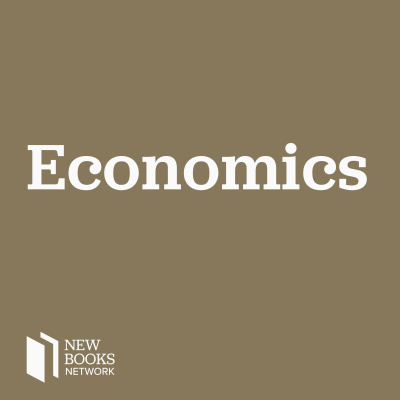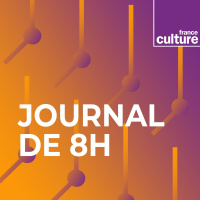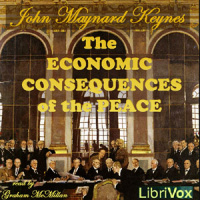Sinopsis
Interviews with Economists about their New Books
Episodios
-
Isabella M. Weber, "How China Escaped Shock Therapy: The Market Reform Debate" (Routledge, 2021)
15/04/2022 Duración: 53minChina has become deeply integrated into the world economy. Yet, gradual marketization has facilitated the country's rise without leading to its wholesale assimilation to global neoliberalism. This book uncovers the fierce contest about economic reforms that shaped China's path. In the first post-Mao decade, China's reformers were sharply divided. They agreed that China had to reform its economic system and move toward more marketization - but struggled over how to go about it. Should China destroy the core of the socialist system through shock therapy, or should it use the institutions of the planned economy as market creators? With hindsight, the historical record proves the high stakes behind the question: China embarked on an economic expansion commonly described as unprecedented in scope and pace, whereas Russia's economy collapsed under shock therapy. Based on extensive research, including interviews with key Chinese and international participants and World Bank officials as well as insights gleaned from
-
Jonathan Beller, "The World Computer: Derivative Conditions of Racial Capitalism" (Duke UP, 2021)
15/04/2022 Duración: 59minIn The World Computer: Derivative Conditions of Racial Capitalism (Duke UP, 2021) Jonathan Beller forcefully demonstrates that the history of commodification generates information itself. Out of the omnipresent calculus imposed by commodification, information emerges historically as a new money form. Investigating its subsequent financialization of daily life and colonization of semiotics, Beller situates the development of myriad systems for quantifying the value of people, objects, and affects as endemic to racial capitalism and computation. Built on oppression and genocide, capital and its technical result as computation manifest as racial formations, as do the machines and software of social mediation that feed racial capitalism and run on social difference. Algorithms, derived from for-profit management strategies, conscript all forms of expression-language, image, music, communication-into the calculus of capital such that even protest may turn a profit. Computational media function for the purpose of e
-
Tim Hwang, "Subprime Attention Crisis: Advertising and the Time Bomb at the Heart of the Internet" (FSG Originals, 2020)
14/04/2022 Duración: 49minIn Subprime Attention Crisis: Advertising and the Time Bomb at the Heart of the Internet (FSG Originals, 2020), Tim Hwang investigates the way big tech financializes attention. In the process, he shows us how digital advertising--the beating heart of the internet--is at risk of collapsing, and that its potential demise bears an uncanny resemblance to the housing crisis of 2008. From the unreliability of advertising numbers and the unregulated automation of advertising bidding wars to the simple fact that online ads mostly fail to work, Hwang demonstrates that while consumers' attention has never been more prized, the true value of that attention itself--much like subprime mortgages--is wildly misrepresented. And if online advertising goes belly-up, the internet--and its free services--will suddenly be accessible only to those who can afford it. Tim Hwang is a writer, researcher, and currently the general counsel for Substack. He is the former director of the Harvard-MIT Ethics and Governance of AI Initiative
-
John A. List, "The Voltage Effect: How to Make Good Ideas Great and Great Ideas Scale" (Currency, 2022)
14/04/2022 Duración: 01h01minMost economists would argue that policies and business strategies are most likely to succeed if they are evidence-based, with their efficacy demonstrated empirically by randomized controlled trials before they are implemented at scale. John List spearheaded the introduction of field experiments in economics, publishing a raft of influential studies with this approach, and using his research insights to help shape both government policy and business strategy. He has learned a thing or two along the way. In The Voltage Effect: How to Make Good Ideas Great and Great Ideas Scale (Currency, 2022), he draws upon his own experiences and his research to show all the ways in which an idea that “works” in a field experiment can fall flat when rolled out at a larger scale. This book provides tremendous insight into both the value of field experiments and the careful attention to detail needed to ensure that they teach us the right lessons. John List is a professor of economics at the University of Chicago. He has also s
-
Mohammad F Anwar and Frank E Danna, "Love as a Business Strategy: Resilience, Belonging & Success" (Lioncrest, 2021)
14/04/2022 Duración: 36minToday I talked to Mohammad F. Anwar and Frank Danna about their book Love as a Business Strategy: Resilience, Belonging & Success (Lioncrest, 2021). Rarely will executives leave themselves vulnerable by sharing what they did wrong in managing people, which in turn led them to take corrective actions. Mohammad Anwar is that rare exception, even going so far as to share on the air his “infamous refrigerator email” where he tore into employees for leaves a “disgusting” mess in the company’s breakroom refrigerator. How to create a psychologically safe place to work is the underlying theme of this episode, which ranges from answering why new hires at Softway always start on a Friday to explaining, a little, about how giving “spot raises” have superseded the previous “fish market” system of dickering for pay increases as part of annual performance reviews. Mohammad F. Anwar is the founder and CEO of Softway, a business-to-employee solutions company that helps build high-performing companies. Frank Danna is a Direct
-
Dashun Wang and Albert-László Barabási, "The Science of Science" (Cambridge UP, 2021)
13/04/2022 Duración: 01h01minListen to this interview of Dashun Wang, Professor at the Kellogg School of Management and McCormick School of Engineering at Northwestern University, and also with Albert-László Barabási, Robert Gray Dodge Professor of Network Science and Distinguished University Professor at Northeastern University. We talk about their new book The Science of Science" (Cambridge UP, 2021) and science, squared. Albert-László Barabási : "There is, of course, the need that you grow professionally. If you're a mathematician, you need to perfect your math. If you're a physicist, you need to do your physics. If you're a biologist, you need to develop your lab techniques. But no matter the magnitude of any discovery you might make, it's not impactful unless you can actually communicate it. And I think that this is where science lacks significantly. I would even go so far as to say, there is a counter-selection: People who are not necessarily the best communicators tend to prefer science because there's the impression that that is
-
The Future of Life Expectancy: A Discussion with Angus Deaton
12/04/2022 Duración: 39minIn 2015, Professor Angus Deaton of Princeton University and his wife Professor Anne Case published a paper highlighting the rising mortality rate among middle-aged white non-Hispanic Americans. They described "deaths of despair" which were often related to drug and alcohol poisoning and suicide. They followed up with a widely read book: Deaths of Despair and the Future of Capitalism (Princeton UP, 2020). In this podcast Owen Bennett-Jones discusses the issue of life expectancy and asks what trends relating to life expectancy are likely to occur in the future. Owen Bennett-Jones is a freelance journalist and writer. A former BBC correspondent and presenter he has been a resident foreign correspondent in Bucharest, Geneva, Islamabad, Hanoi and Beirut. He is recently wrote a history of the Bhutto dynasty which was published by Yale University Press. Learn more about your ad choices. Visit megaphone.fm/adchoices Support our show by becoming a premium member! https://newbooksnetwork.supportingcast.fm/economics
-
R. Douglas Arnold, "Fixing Social Security: The Politics of Reform in a Polarized Age" (Princeton UP, 2022)
08/04/2022 Duración: 45minSince its establishment, Social Security has become the financial linchpin of American retirement. Yet demographic trends—longer lifespans and declining birthrates—mean that this popular program now pays more in benefits than it collects in revenue. Without reforms, 83 million Americans will face an immediate benefit cut of 20 percent in 2034. How did we get here and what is the solution? In Fixing Social Security: The Politics of Reform in a Polarized Age (Princeton University Press, 2022), R. Douglas Arnold explores the historical role that Social Security has played in American politics, why Congress has done nothing to fix its insolvency problem for three decades, and what legislators can do to save it. What options do legislators have as the program nears the precipice? They can raise taxes, as they did in 1977, cut benefits, as they did in 1983, or reinvent the program, as they attempted in 2005. Unfortunately, every option would impose costs, and legislators are reluctant to act, fearing electoral retr
-
Roberta Moore, "Emotion at Work: Unleashing the Secret Power of Emotional Intelligence" (Conscious Choice, 2018)
07/04/2022 Duración: 36minToday I talked to Roberta Moore, author of Emotion at Work: Unleashing the Secret Power of Emotional Intelligence (Conscious Choice, 2018). Much like methodologies that focus on a range of personality traits, the approach taken by today’s guest looks at 16 different skills grouped into five categories. Those categories are self-perception, self-expression, interpersonal, decision-making, and stress management. Which are you best at? Where might you falter? Compare your answers to those Moore shares from two decades of work with clients in leadership roles across a range of industries. One notable client: a high-powered art dealer whose ability to handle stress is challenged anytime a “cargo” of Van Goghs, for instance, run the risk of going unguarded on the tarmac when the flight schedules change! Roberta Ann Moore is a business executive and licensed therapist, certified in Dr. Reuven Bar-On’s model of emotional intelligence. She provides assessments, training and developing using the EQ-I 2.0 and EQ 360 pro
-
Nic Marsh et al., "Indefensible: Seven Myths that Sustain the Global Arms Trade" (Zed Books, 2017)
07/04/2022 Duración: 40minAlthough there is often opposition to individual wars, most people continue to believe that the arms industry is necessary in some form: to safeguard our security, provide jobs and stimulate the economy. Not only conservatives, but many progressives and liberals, support it for these reasons. Indefensible puts forward a devastating challenge to this conventional wisdom, which has normalized the existence of the most savage weapons of mass destruction ever known. Indefensible: Seven Myths that Sustain the Global Arms Trade (Zed Books, 2017) is the essential handbook for those who want to debunk the arguments of the industry and its supporters: deploying case studies, statistics and irrefutable evidence to demonstrate they are fundamentally flawed, both factually and logically. Far from protecting us, the book shows how the arms trade undermines our security by fanning the flames of war, terrorism and global instability. In countering these myths, the book points to ways in which we can combat the arms trade's
-
Pandemic Perspectives 5: Necessarily Global--How the Pandemic Forces Us To Think Bigger
06/04/2022 Duración: 45minIn this Pandemic Perspectives Podcast, Ideas Roadshow founder and host Howard Burton talks to Andy Hoffman, the dynamic and innovative business professor at the University of Michigan, about what the pandemic has brought to light to effectively address our many pressing global problems. Ideas Roadshow's Pandemic Perspectives Project consists of three distinct, reinforcing elements: a documentary film (Pandemic Perspectives), book (Pandemic Perspectives: A filmmaker's journey in 10 essays) and a series of 24 detailed podcasts with many of the film's expert participants. Visit www.ideasroadshow.com for more details. Howard Burton is the founder of Ideas Roadshow and host of the Ideas Roadshow Podcast. He can be reached at howard@ideasroadshow.com. Learn more about your ad choices. Visit megaphone.fm/adchoices Support our show by becoming a premium member! https://newbooksnetwork.supportingcast.fm/economics
-
Haakon Gjerløw and Carl Henrik Knutsen, "One Road to Riches?: How State Building and Democratization Affect Economic Development" (Cambridge UP, 2021)
06/04/2022 Duración: 41minBuilding effective state institutions before introducing democracy is widely presumed to improve different development outcomes. Conversely, proponents of this "stateness-first" argument anticipate that democratization before state building yields poor development outcomes. In One Road to Riches?: How State Building and Democratization Affect Economic Development (Cambridge UP, 2021), we discuss several strong assumptions that (different versions of) this argument rests upon and critically evaluate the existing evidence base. In extension, we specify various observable implications. We then subject the "stateness-first" argument to multiple tests, focusing on economic growth as an outcome. First, we conduct historical case studies of two countries with different institutional sequencing histories, Denmark and Greece, and assess the "stateness-first" argument (e.g., by using a synthetic control approach). Thereafter, we draw on an extensive global sample of about 180 countries, measured across 1789-2019 and le
-
Jonathan Haskel and Stian Westlake, "Restarting the Future: How to Fix the Intangible Economy" (Princeton UP, 2022)
05/04/2022 Duración: 01h01minThe past two decades have witnessed sluggish economic growth, mounting inequality, dysfunctional competition, and a host of other ills that have left people wondering what has happened to the future they were promised. Restarting the Future reveals how these problems arise from a failure to develop the institutions demanded by an economy now reliant on intangible capital such as ideas, relationships, brands, and knowledge. In this groundbreaking and provocative book, Jonathan Haskel and Stian Westlake argue that the great economic disappointment of the century is the result of an incomplete transition from an economy based on physical capital, and show how the vital institutions that underpin our economy remain geared to an outmoded way of doing business. The growth of intangible investment has slowed significantly in recent years, making the world poorer, less fair, and more vulnerable to existential threats. Haskel and Westlake present exciting new ideas to help us catch up with the intangible revolution, o
-
Robert Buderi, "Where Futures Converge: Kendall Square and the Making of a Global Innovation Hub" (MIT Press, 2022)
05/04/2022 Duración: 57minKendall Square in Cambridge, Massachusetts, has been called “the most innovative square mile on the planet.” It's a life science hub, hosting Biogen, Moderna, Pfizer, Takeda, and others. It's a major tech center, with Google, Microsoft, IBM, Amazon, Facebook, and Apple all occupying big chunks of pricey office space. Kendall Square also boasts a dense concentration of startups, with leading venture capital firms conveniently located nearby. And of course, MIT is just down the block. In Where Futures Converge: Kendall Square and the Making of a Global Innovation Hub (MIT Press, 2022), Robert Buderi offers the first detailed account of the unique ecosystem that is Kendall Square, chronicling the endless cycles of change and reinvention that have driven its evolution. Buderi, who himself has worked in Kendall Square for the past twenty years, tells fascinating stories of great innovators and their innovations that stretch back two centuries. Before biotech and artificial intelligence, there was railroad car inno
-
Gary Gerstle, "The Rise and Fall of the Neoliberal Order: America and the World in the Free Market Era" (Oxford UP, 2022)
05/04/2022 Duración: 02h18minThe epochal shift toward neoliberalism–– a web of related policies that, broadly speaking, reduced the footprint of government in society and reassigned economic power to private market forces-that began in the United States and Great Britain in the late 1970s fundamentally changed the world. Today, the word neoliberal is often used to condemn a broad swath of policies, from prizing free-market principles over people to advancing privatization programs in developing nations around the world. To be sure, neoliberalism has contributed to a number of alarming trends, not least of which has been a massive growth in income inequality. Yet as the eminent historian Gary Gerstle argues in The Rise and Fall of the Neoliberal Order: America and the World in the Free Market Era (Oxford University Press, 2022), these indictments fail to reckon with the full contours of what neoliberalism was and why its worldview had such a persuasive hold on both the right and the left for three decades. As he shows, the neoliberal orde
-
The Business of Scholarly Communication and Publishing
05/04/2022 Duración: 01h07minListen to this interview of Joe Esposito, Senior Partner of Clarke & Esposito. We talk about the space between academic research and consumer markets, and we travel in space to the metaverse! Joe Esposito : "The thing that's at issue when a field of study begins publishing more in journals and less in books is another aspect of the audience. If you're a scientist, you write short articles because this is what gets you tenure, this is what gets you a promotion, this is what allows you to go to grants-making bodies and get money to hire postdoctoral students and to build out your laboratory. So the aspect of audience I'm talking about here is broader than just your fellow experts in your field — it's broader than just the readers of your communications, because it includes, too, the business model that these communications are placed into. There is money in articles in the sciences. There is very little money in books in the sciences. But switch over to history, anthropology, literary criticism, and the whole s
-
Megan Tobias Neely, "Hedged Out: Inequality and Insecurity on Wall Street" (U of California Press, 2022)
04/04/2022 Duración: 42minIs the finance industry fair? In Hedged Out: Inequality and Insecurity on Wall Street (University of California Press, 2022) Megan Tobias Neely, an assistant professor in the Department of Organisation at Copenhagen Business School, explores this question by asking who is successful, and who is excluded, in hedge funds. Drawing on ethnography and interviews, the book sets out how elite, white, masculinity is the dominant demographic of the industry, along with the importance of patronage relationships in perpetuating inequalities. It also explores the narratives and justifications used to explain the persistence of exclusions, even in the context of an industry that is supposed to reward passion and talent. Closing with a powerful call to transform both the finance industry and the world, the book is essential reading across social science and business, as well as for anyone interested in understanding how inequality persists. Dave O'Brien is Professor of Cultural and Creative Industries, at the University
-
Michael J. Graetz and Ian Shapiro, "The Wolf at the Door: The Menace of Economic Insecurity and How to Fight It" (Harvard UP, 2020)
04/04/2022 Duración: 57minThis is an age of crisis. That much we can agree on. But a crisis of what? And how do we get out of it? Many on the right call for tax cuts and deregulation. Others on the left rage against the top 1 percent and demand wholesale economic change. Voices on both sides line up against globalization: restrict trade to protect jobs. In The Wolf at the Door: The Menace of Economic Insecurity and How to Fight It (Harvard UP, 2020), two leading political analysts argue that these views are badly mistaken. Michael Graetz and Ian Shapiro focus on what really worries people: not what the rich are making but rather their own insecurity and that of people close to them. Americans are concerned about losing what they have, whether jobs, status, or safe communities. They fear the wolf at the door. The solution is not protectionism or class warfare but a return to the hard work of building coalitions around realistic goals and pursuing them doggedly through the political system. This, Graetz and Shapiro explain, is how earli
-
Joseph Fishkin and William E. Forbath, "The Anti-Oligarchy Constitution: Reconstructing the Economic Foundations of American Democracy" (Harvard UP, 2022)
31/03/2022 Duración: 01h31minOligarchy is a threat to the American republic. When too much economic and political power is concentrated in too few hands, we risk losing the “republican form of government” the Constitution requires. Today, courts enforce the constitution as if it had almost nothing to say about this threat. The Anti-Oligarchy Constitution: Reconstructing the Economic Foundations of American Democracy (Harvard University Press, 2022) is a bold call to reclaim an American tradition that argues the constitution imposes a duty on government to fight oligarchy and ensure broadly shared wealth. In this revolutionary retelling of constitutional history, Dr. Joseph Fishkin and Dr. William Forbath show that a commitment to prevent oligarchy once stood at the center of a robust tradition in American political and constitutional thought. Dr. Fishkin and Dr. Forbath argue that “The constitutional order does rest and depend on a political-economic order. That political-economic order does not maintain itself. It requires action (as we
-
Tirthankar Roy and Anand V. Swamy, "Law and the Economy in a Young Democracy: India 1947 and Beyond" (UChicago Press, 2022)
30/03/2022 Duración: 01h21minIn Law and the Economy in a Young Democracy: India 1947 and Beyond (University of Chicago Press, 2022), Dr. Tirthankar Roy and Dr. Anand Swamy present an essential history of India’s economic growth since 1947, including the legal reforms that have shaped the country in the shadow of colonial rule. They argue that “colonial rule left India a highly unequal society with a complicated structure of land rights, a slow and dysfunctional legal system, and a state that was all powerful in some areas.” Economists have long lamented how the inefficiency of India’s legal system undermines the country’s economic capacity. How has this come to be? The prevailing explanation is that the postcolonial legal system is understaffed and under-resourced, making adjudication and contract enforcement slow and costly. Taking this as given, Law and the Economy in a Young Democracy examines the contents and historical antecedents of these laws, including how they have stifled economic development. Dr. Roy and Dr. Swamy argue that l














